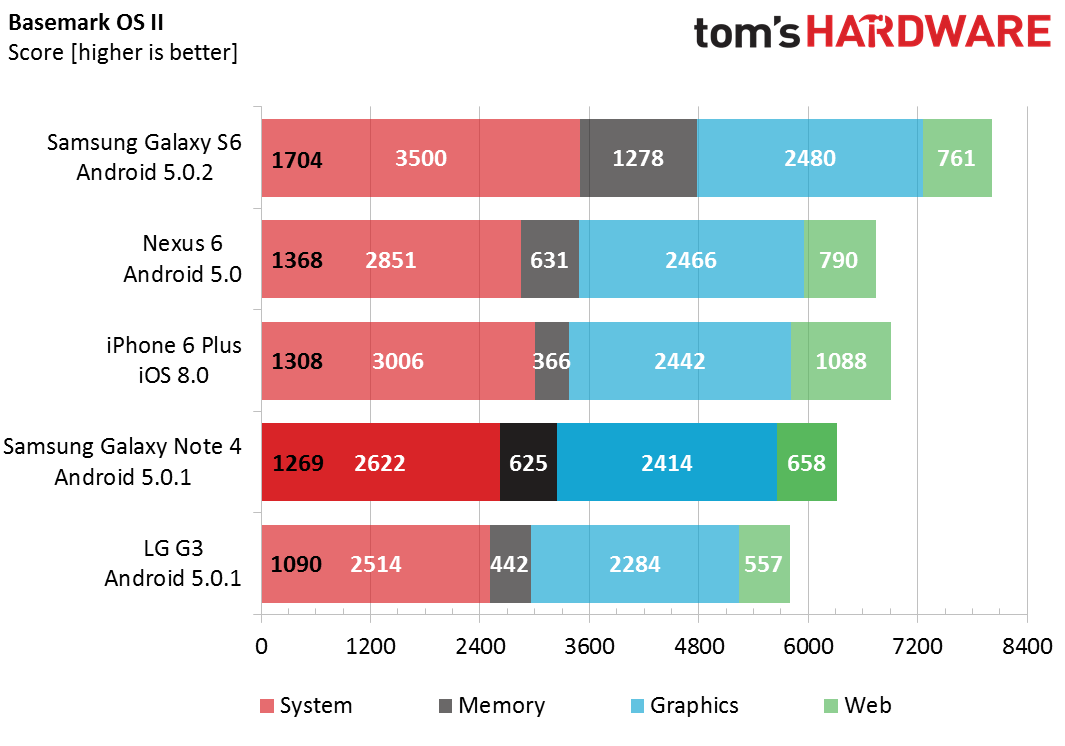Samsung Galaxy Note 4 Review
The Samsung Galaxy Note 4 sports a big, high-quality screen; large, removable battery; speedy processor; stylus; and specialized software for power users.
Why you can trust Tom's Hardware
CPU And System Performance
In this section, we evaluate system-level performance by running a series of synthetic and real-world workloads, along with some browser-based Web tests. There are several facets to overall device performance, including single- and multi-threaded CPU performance, memory and storage speed, and GPU rendering, all of which will be probed by our suite of benchmarks. If you're interested in learning more about how these benchmarks work, what versions we use, or our testing methodology, please read our article about how we test mobile device system performance.
The Galaxy Note 4 uses the same Snapdragon 805 SoC as the Nexus 6, so we should see similar levels of performance. In Basemark OS II, they do indeed perform about the same. The Exynos 7420's four Cortex-A57 CPUs in the Galaxy S6 outperform the Note 4's older Krait 450 cores by 34% in the single- and multi-threaded CPU System test despite Krait's clock speed advantage. Interestingly, the Adreno 420 GPU in the Note 4 offers similar performance to the PowerVR GX6450 in the iPhone 6 Plus and the Mali T760MP8 in the GS6 for this OpenGL ES 2.0 based graphics test.
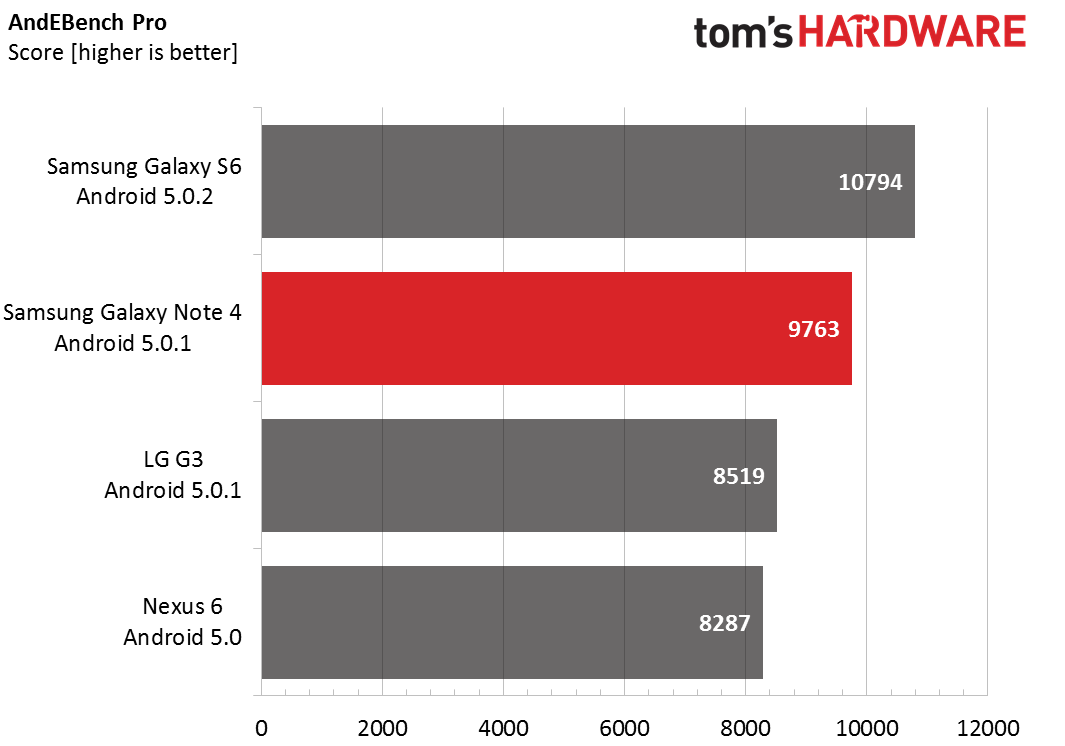
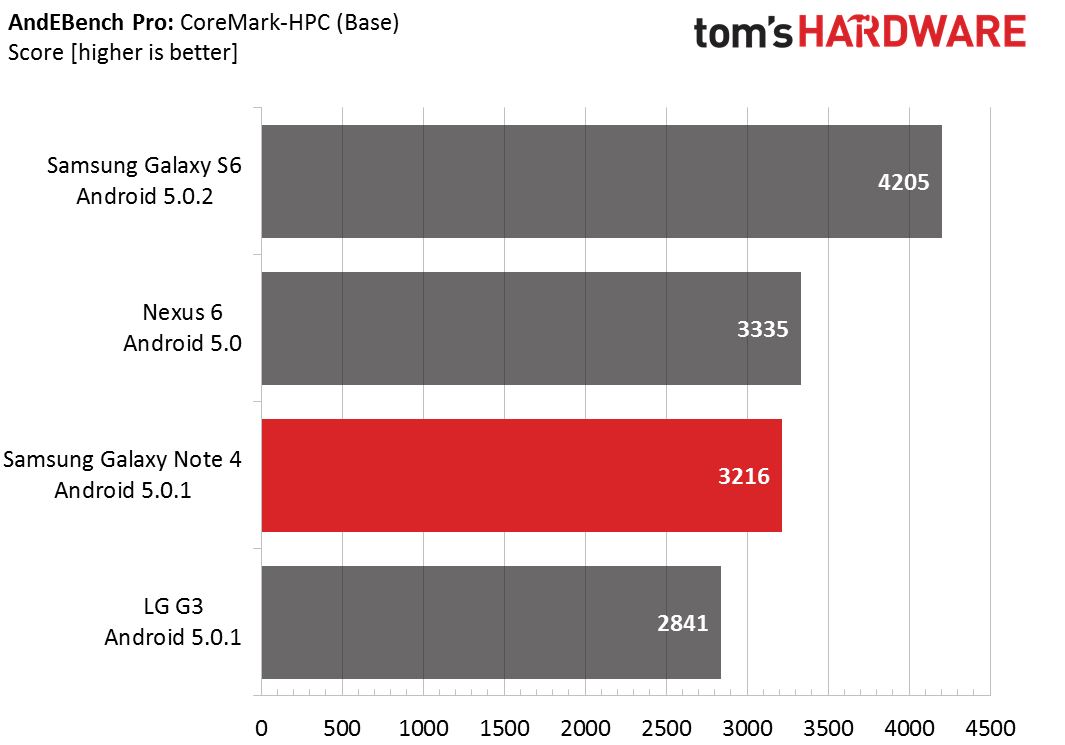
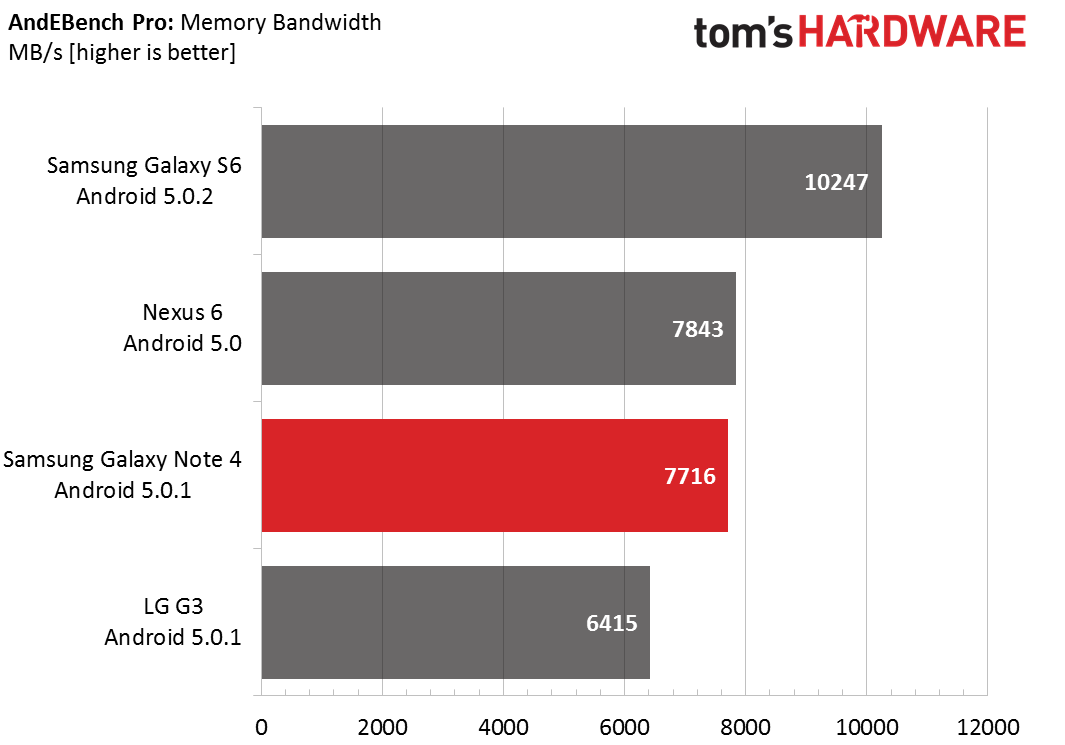
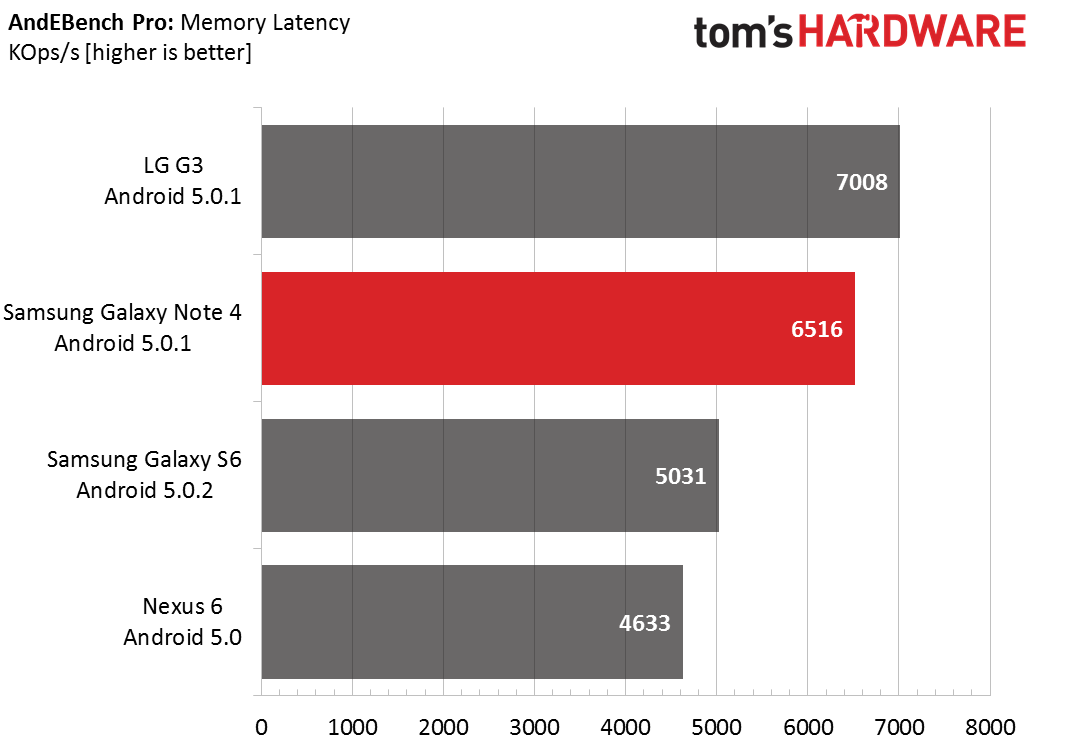
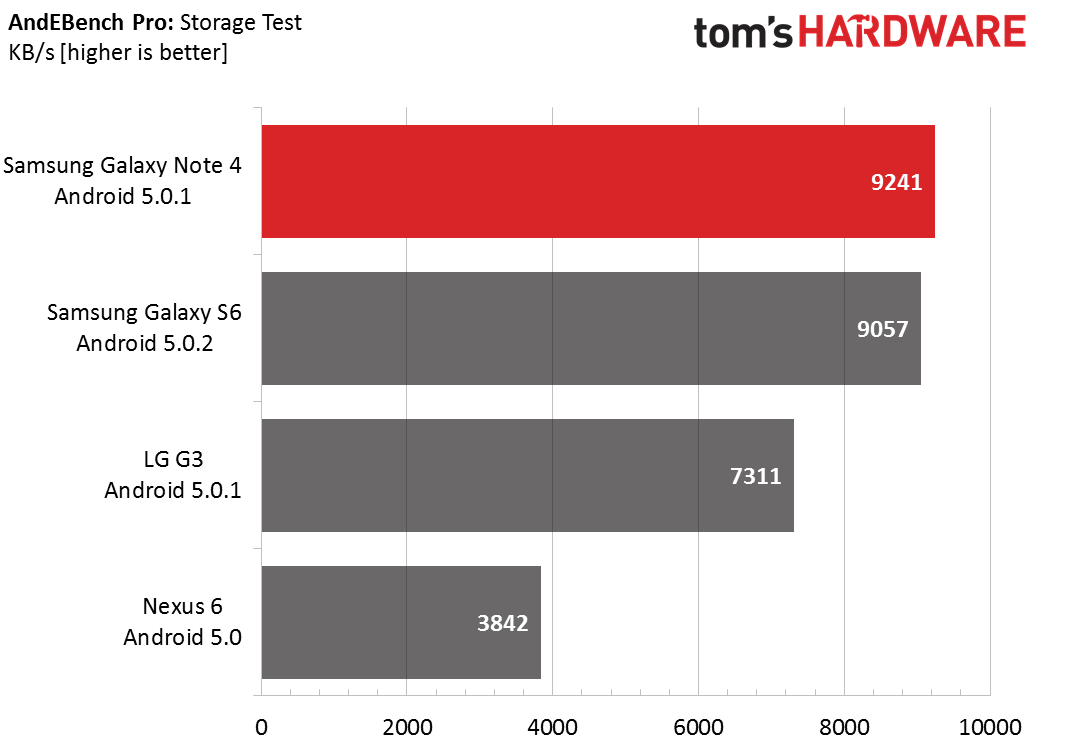
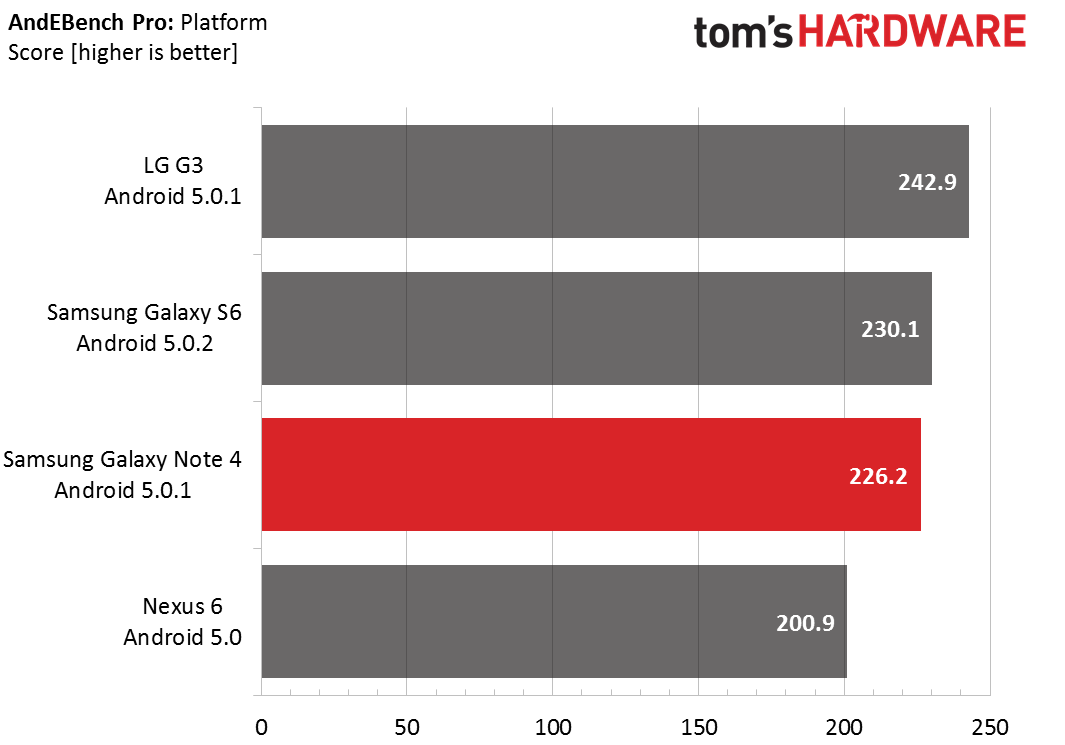
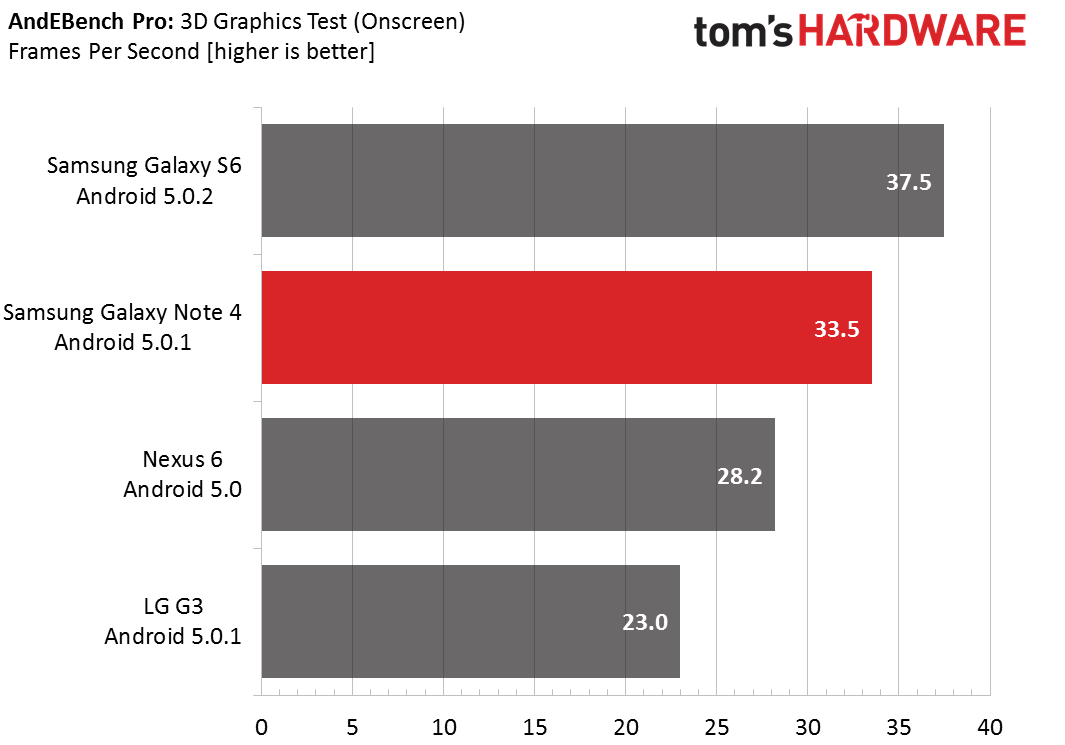
The Note 4 performs well overall in AndEBench, pulling ahead of the Nexus 6 in the 3D Graphics and CPU-centric Platform tests. In CoreMark-HPC, another test for single- and multi-threaded CPU performance, the GS6 once again outperforms the Note 4 by 31%. The GS6 also outperforms both Snapdragon 805 devices in the Memory Bandwidth test even though they all have the same theoretical max bandwidth of 25.6 GB/s.
We previously discussed the Nexus 6's storage performance issue, which results from using full disk encryption. It's no surprise then to see the Note 4 pull well ahead of it in this test. It is a little surprising to see it match the performance of the UFS 2.0 based NAND in the GS6 though.
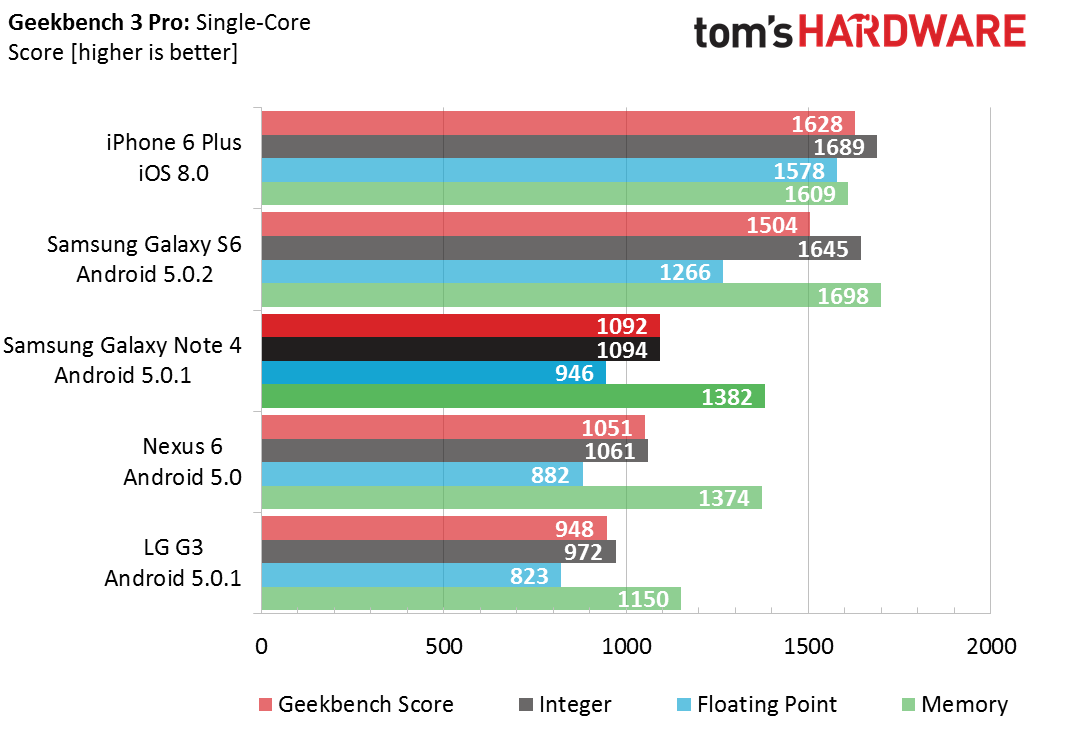
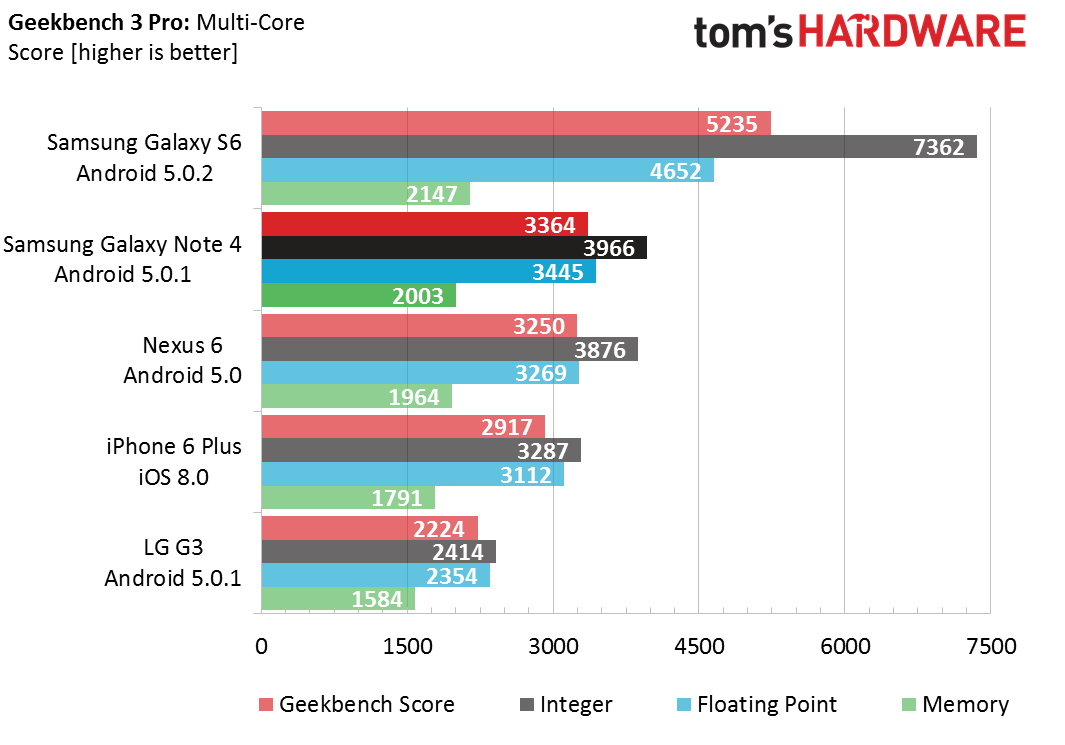
In Geekbench, both the Note 4 and Nexus 6 perform virtually the same. Compared to the Snapdragon 801 phones, the Note 4's Krait CPU is clocked 8% higher and performs 6% to 14% better in the two single-core CPU tests depending on which device we're comparing. There's a wider 20% gap in memory performance over the 801, but in everyday use the Snapdragon 805's advantage will not really be noticeable.
On the surface, the Cortex-A57 CPU seems to give the GS6 a noticeable advantage over the Note 4 in single-core performance, posting a 50% higher integer score and a 34% higher floating point score. Remember however, that the A57 uses the newer 64-bit AArch64 ISA, which includes additional SIMD cryptography instructions. This was discussed in our Snapdragon 810 Performance Preview, where we broke down the performance gains in each Geekbench Integer subtest. If we remove the encryption tests, notably for AES and SHA1, then the GS6's advantage in single-core integer performance drops to 20%. The floating point delta stands, since it does not include any encryption tests.
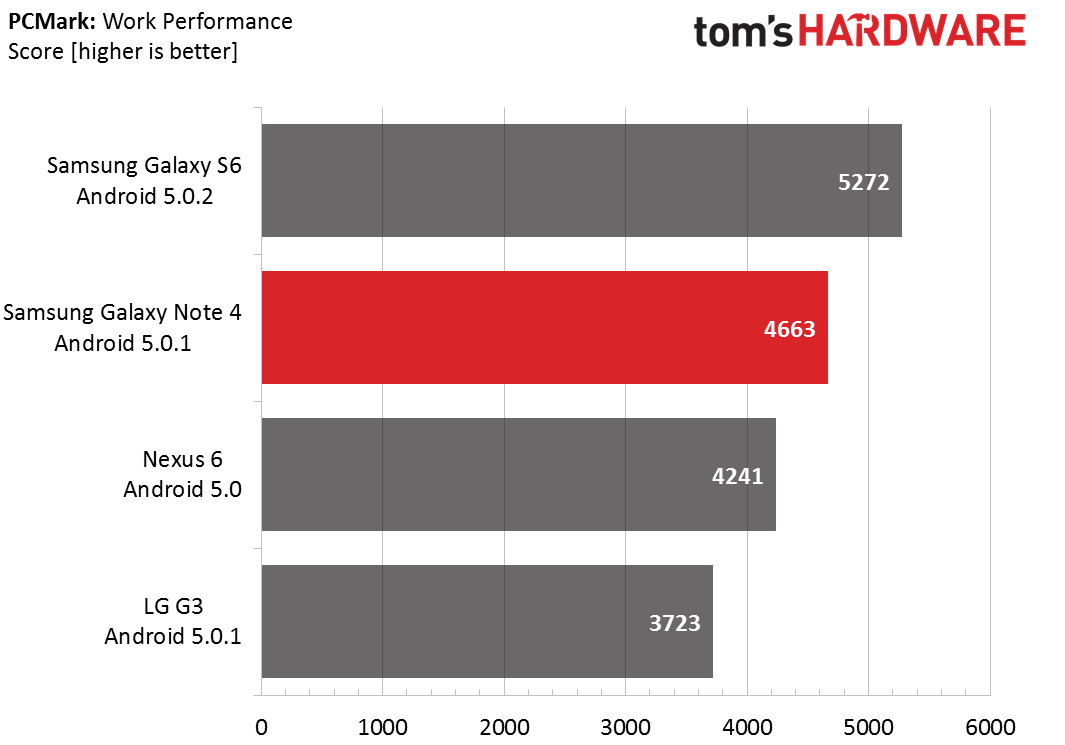
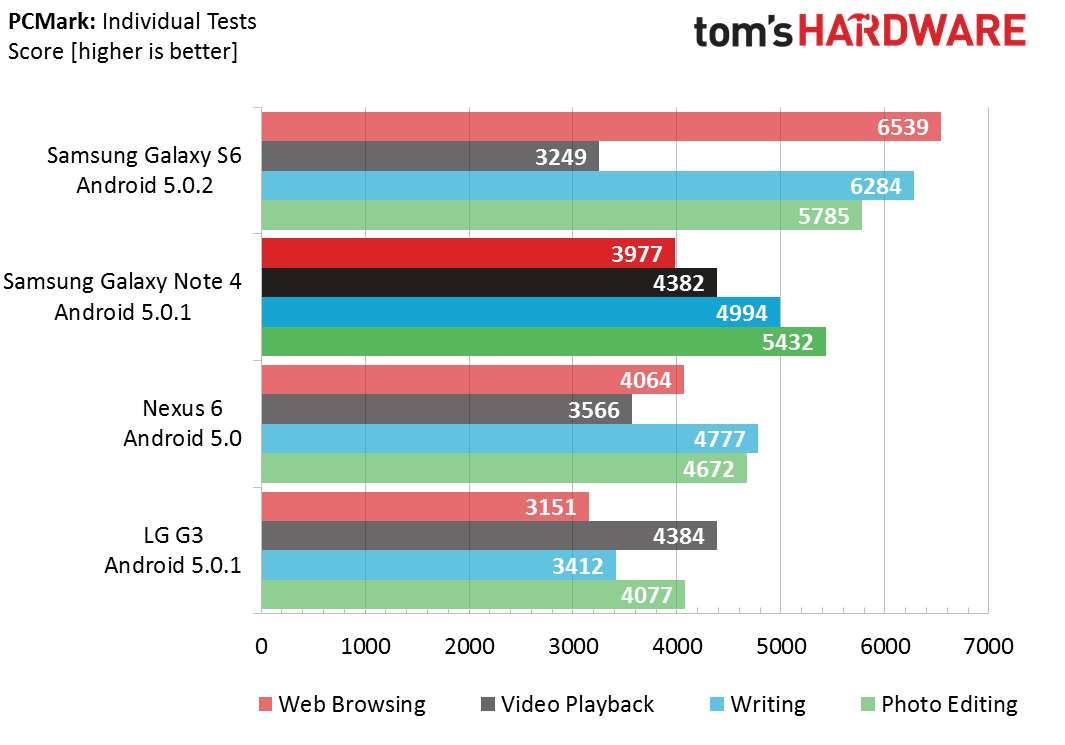
Turning away from the synthetic benchmarks to a more realistic workload, the GS6's performance advantage drops to 13% overall. Breaking this down further shows the newer GS6 with a substantial 64% advantage in the Web Browsing test and 26% in the Writing test. The Note 4 manages to best the GS6 in the Video Playback test however.
Get Tom's Hardware's best news and in-depth reviews, straight to your inbox.
Performance between the Note 4 and Nexus 6 is pretty close, with the Note 4 holding a slim lead in most workloads. Compared to the previous generation Snapdragon 801 in the LG G3, the Note 4 performs 25% better overall. The 805's advantage diminishes when compared to other 801 devices however: 20% better than the Sony Z3, 15% better than the HTC One (M8), and only 2% better than the Galaxy S5. Differences in CPU governor behavior accounts for the variation. For the G3, LG shows a preference for battery life over performance (likely to offset the effects of the QHD display) maintaining a lower average CPU frequency than the higher performing Galaxy S5.
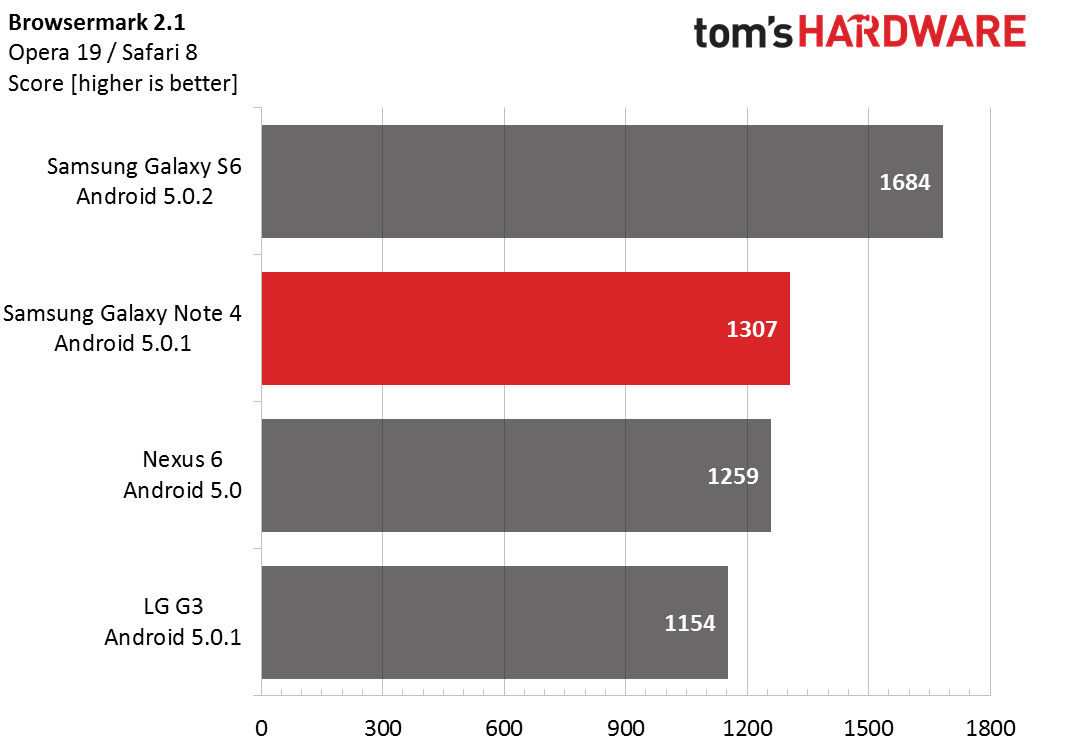
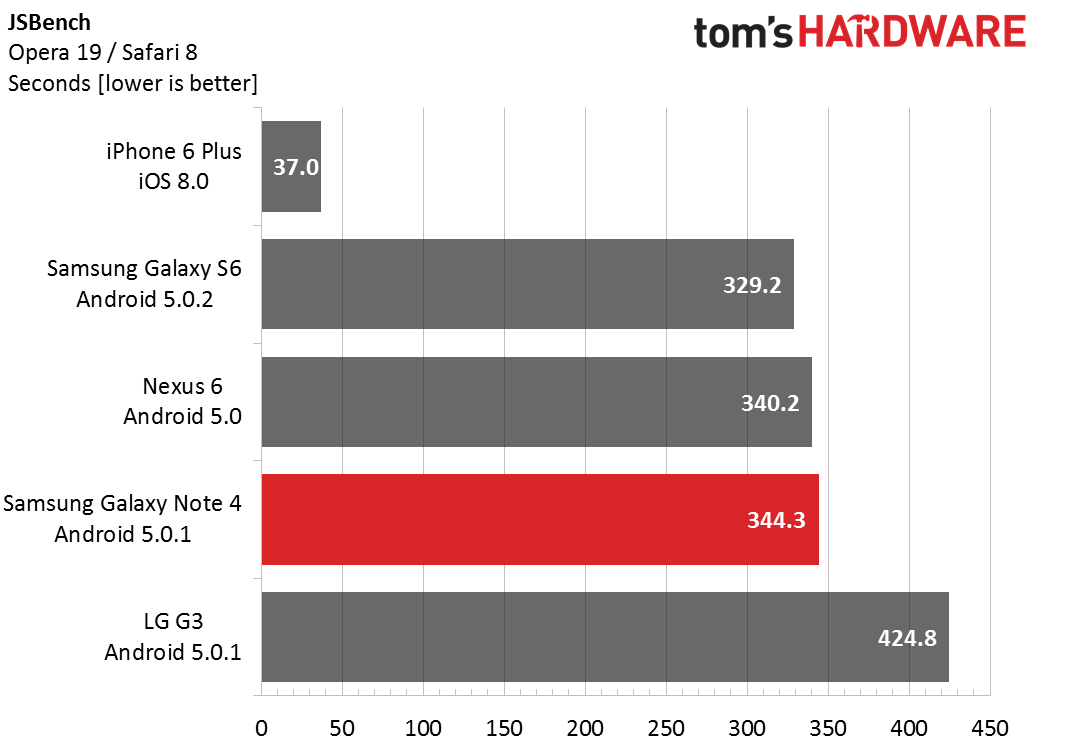
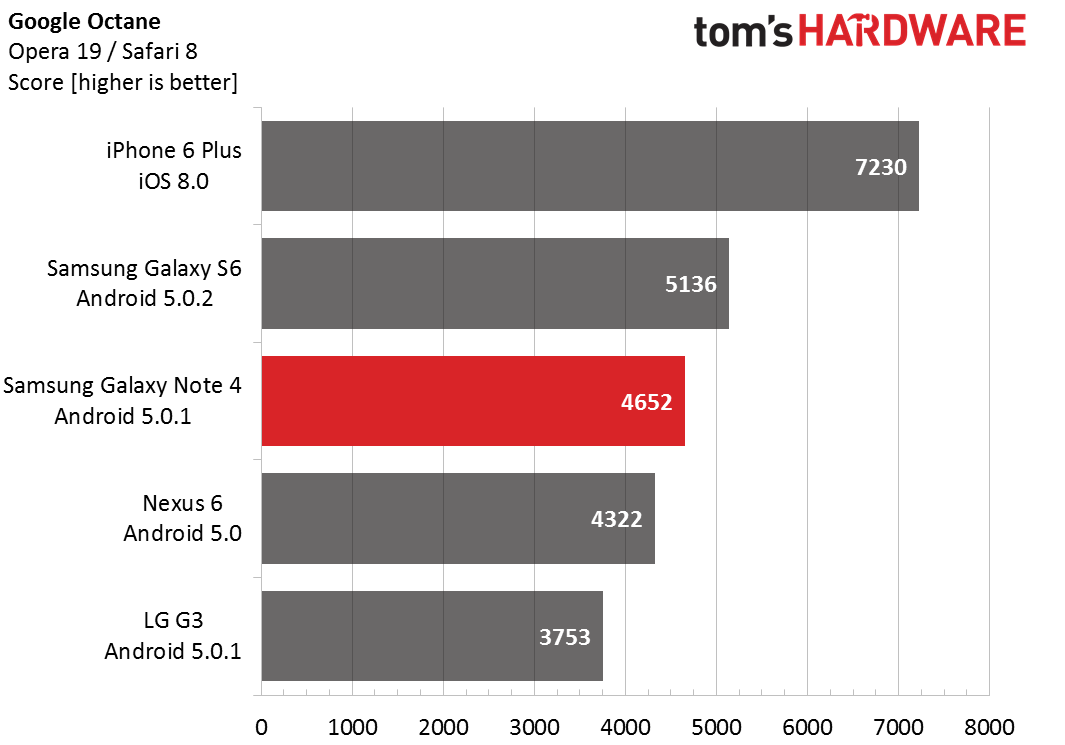
There's no real performance difference between the Note 4 and Nexus 6 for web browsing. The performance delta between the Note 4 and the GS6 varies between essentially nothing in JSBench to 26% in Browsermark.
The Note 4 is a bit slower than the Nexus 6 when it comes to scrolling a web page and UI responsiveness in general. Where browser scrolling is mostly a smooth affair on the Nexus 6, there's definitely some stutter with the Note 4. When scrolling within a web page, the Note 4 sets the CPU frequency to 1190MHz compared to 1497MHz for the Nexus 6 running Android 5.1 (it used 1728MHz with Android 5.0). The two devices also use different touch input boost frequencies: 1267MHz for the Note 4 and 1497MHz for the Nexus 6. The smoother experience on the Nexus 6 comes at the expense of battery life however.
Overall, the Galaxy Note 4's system performance is very good, matching or slightly exceeding the performance of the similarly equipped Nexus 6. Since the Krait CPUs in Snapdragon 805 receive only an 8% bump in frequency, we don't see a substantial difference in performance between the Note 4 and the older Snapdragon 801 phones. And while the newer Galaxy S6 definitely offers better performance, the Note 4 really is not that far behind.
-
ZolaIII All in all nice review but I somehow feel you skipped a litle audio section. Not that I blame you much for it as Qualcomms solution is nothing special & it's far behind WolfsonMicro's WM5110 used on Exunos equipped models. Looks like you still didn't got to the bottom of bus frequency scaling dependencies on this Qualcomms SoC gen. ??Reply -
Vorador2 Replythis came out long ago!
It's a tradition. Everybody reviews phones in the week before or after a phone is released.
Tomshardware is better than that. Fashionably late to the party. -
jafrugh Replythis came out long ago!
It's a tradition. Everybody reviews phones in the week before or after a phone is released.
Tomshardware is better than that. Fashionably late to the party.
Well if you think Toms's Hardware needs to be quicker on the draw for phone reviews, go to this article: http://www.tomshardware.com/news/mobile-editors-wanted,29105.html -
Vlad Rose Replythis came out long ago!
I thought the same thing considering I'm using a Note 4 Edge right now... lol -
alex davies Replythis came out long ago!
The difference between our review and others is that we tested the Note 4 running the Lollipop update, which only came out recently.
We also compare its performance to newer devices such the Galaxy S 6, so you can see how the Note 4's older SoC compares to the latest and greatest. -
MobileEditor ReplyAll in all nice review but I somehow feel you skipped a litle audio section. Not that I blame you much for it as Qualcomms solution is nothing special & it's far behind WolfsonMicro's WM5110 used on Exunos equipped models. Looks like you still didn't got to the bottom of bus frequency scaling dependencies on this Qualcomms SoC gen. ??
I agree with you regarding our audio testing. I'm definitely not happy with it. We need to acquire some testing equipment, but the hardware we found cost $30k!!! Needless to say, we're still using my ears, because they're cheap.
If you, or any of our readers, could point me towards some audio testing equipment that mere mortals can afford, please PM me.
I did not investigate the bus scaling on the Note 4, partly because this review was finished by then and partly because the Note 4 did not exhibit "unusual" behavior. We will be examining this for the GS6.
- Matt H. -
10tacle Nice review and very useful to people like me needing an upgrade after skipping two generations of smart phones. I usually keep mine 3 years, and my Droid Bionic is like running a Core 2 Duo desktop these days. I'm still debating between the Note or Galaxy. Apples are out because 1) I don't like the fact that the battery *cannot* be removed to completely shut the phone off, and 2) no MicroSD slot for memory expansion.Reply
There will come a time when all smart phones from all manufacturers no longer allow SD memory upgrades, and I think that time is coming sooner rather than later. After all, one can go buy a 128GB $100 MicroSD card, but if Apple users want a 128GB phone, they have to shell out another $200 clams from the base 16GB model, and they don't get the extra "free" GB memory to start with after upgrading that came with the Android.
But with that said, there are some people reporting about overheating and battery drain with their Note 4. Battery drain can be a problem with the provider though like a cell tower being down. Plus, the Note 5 is coming in a few months, possibly in July. I'm hoping it still has an SD slot otherwise I'll get the 4 and hope the serious overheating and battery drain reports are a fluke.
